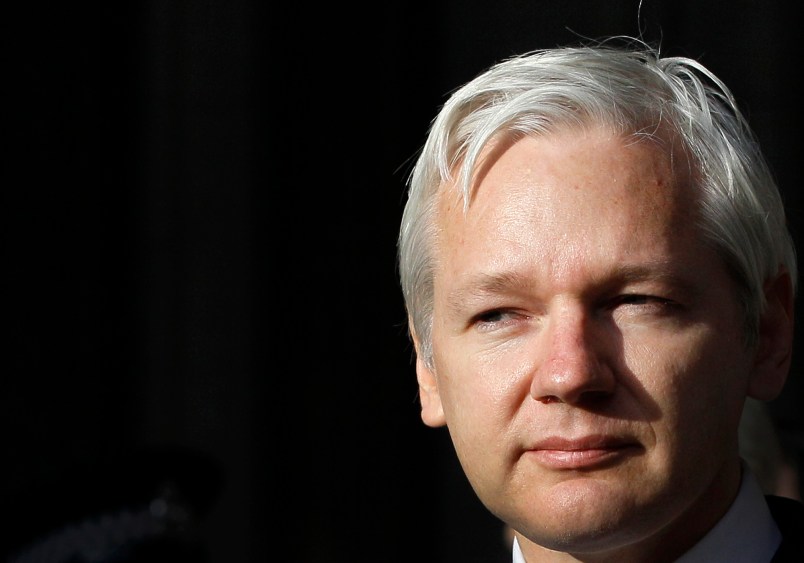There is something quietly delicious about the Ecuadorean government’s apparently temporary denial of Internet access to asylum seeker Julian Assange and the herculean scale of entitlement displayed by Assange and his backers in the face of the Ecuadorean government’s decision.
Assange has been holed up in the Ecuadorean Embassy in London since 2012, to escape questioning for a sexual abuse or rape charge in Sweden. Assange and his supporters say they fear he could be extradited to the US if taken into custody, though there’s never been any evidence that this was or is the case and there are at least no public charges against Assange in the United States. However that may be, he’s been in the Embassy ever since. The government of Ecuador has now cut off Assange’s Internet access, it says temporarily, so as not to be party to efforts to “interfere [in the] electoral processes” of the United States.
We don’t know if the US government asked the government of Ecuador to take this step or if they saw the escalating gravity of the situation and acted without prompting. The US and Ecuador say this hasn’t happened; but who knows? It is, however, not difficult to see the situation in which Assange has placed the government of Ecuador.
According to the US government, the theft of emails from various Democratic party organizations is the work of the Russian intelligence services. Somehow that stolen material has found its way to Wikileaks, which has made itself their main distribution channel. Whether Assange and Wikileaks are directly in contact with Russian intelligence agencies or simply receiving them through a cut-out of intermediary is not terribly relevant. Assange’s extreme hostility to Hillary Clinton and emerging affection for Donald Trump (as displayed through the Wikileaks twitter feed and his own personal statements) make it impossible to avoid the conclusion that he is trying to affect the outcome of the election rather than carrying out some disinterested campaign in the cause of transparency. That’s clear whatever the motives of the people who actually did the stealing. If the hacks were the work of a non-state actor it would be one thing. Putting a hostile, nuclear power into the mix which is itself trying to interfere with the US election process – though with what aim is not entirely clear – just escalates the situation massively. Both as a prudential decision and on the merits, it is hardly surprising Ecuador wanted to remove Assange’s voice, if not his organization’s actions, from the Internet for the remainder of the US election cycle.
It’s important to note here that the avalanche of emails and documents apparently stolen by Russian security services and distributed by Assange and Wikileaks have contained no evidence of wrong-doing or even inappropriate behavior, no substantial new information about any public policy question. The entirety of the impact has been a slow drip of minor embarrassments based on having private discussions released to the world. A good guide on this is Larry Lessig, a true advocate of government transparency at all levels. (Minor disclosure: the first two articles I ever published as a journalist were an interview with Lessig and a couple of articles based on that interview.) He was dissed in one of the Podesta cache emails by Neera Tanden (an acquaintance of mine). Here’s how he responded on his personal site yesterday.
I’m a big believer in leaks for the public interest. That’s why I support Snowden, and why I believe the President should pardon him.
But I can’t for the life of me see the public good in a leak like this — at least one that reveals no crime or violation of any important public policy.
We all deserve privacy. The burdens of public service are insane enough without the perpetual threat that every thought shared with a friend becomes Twitter fodder. Neera has only ever served in the public (and public interest) sector. Her work has always and only been devoted to advancing her vision of the public good. It is not right that she should bear the burden of this sort of breach.
It is admirable and entirely in character to be able to be able to distinguish transparency from abuse and respond so graciously even when a personal sleight is involved.
In any case, back to Assange.
It’s worth thinking about the sheer comedy of those claiming that cutting off Assange’s wifi access constitutes some assault on free speech or human rights. If you’re using a country’s sanctuary to avoid questioning in a rape investigation on the pretty weak rationale that the rape investigation could evolve into extradition and charges in the United States … and you choose to involve yourself in a little disguised effort to subvert the electoral process in Country A in some sort of de facto alliance with a foreign power hostile to Country A … well, you may tax the patience of your hosts. They may change the password on the Wifi. The world of international intrigue can be hard – especially when it comes to on-demand broadband Internet. Whether they have principled opposition to such interference or simply don’t want to get dragged into a great power controversy because of your obsessions and vengeances or both, the upshot leads in the same direction.
Again, the moment of foiled entitlement is simply delicious.
It’s important to note that Ecuador has gone out of its way to reaffirm that Assange’s asylum status is not in question and that it is taking no steps to interfere in Wikileaks work. But if you choose to get involved in trying to manipulate an election, your hosts may choose to cut off your wifi.






